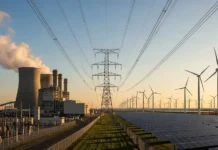Last month, solar energy production made up 22.1 percent of the EU’s power, the highest percentage so far. This is up from 18.9 percent a year earlier. That number puts it just ahead of nuclear energy, which made up 21.8 percent, and wind energy, which made up around 16 percent.
In June, at least 13 EU nations set new records for solar energy production. Germany, Spain, and the Netherlands were some of the biggest producers.
Greece obtains 35% of its power from the sun, whereas the Netherlands gets more than 40%.
Belgium, Croatia, France, Hungary, Italy, Portugal, and Slovakia also set new records for solar energy production.
“This milestone shows how rapidly the EU’s power system is changing,” said Chris Rosslowe, senior energy analyst at Ember. “Solar is stepping up when it’s needed most – during summer heatwaves and peak demand.”
In June, coal made up just over 6 percent of the EU’s power mix, the lowest level ever and down from over 9 percent a year earlier.
Germany and Poland still use most of the EU’s coal, although both witnessed historic lows.
About 12% of Germany’s power came from coal, and about 43% of Poland. Last month, Spain got less than 1% of its electricity from coal. The country aims to stop using coal shortly.
In June, ten EU nations, including Ireland, which shut down its final coal plant on June 20, didn’t consume any coal at all.
Wind power also picked up in May and June after a weak start to the year. Wind farms produced the most power ever in those months.
Even though renewables grew quickly, fossil fuel usage in the EU was by 13% in the first half of 2025. Gas plants helped offset lower levels of hydro and wind power produced early in the year, while an extended dry period lowered hydro production by 15 percent compared to previous year.
The EU’s total power consumption is also going up, by 2.2 percent so far this year.
Experts argue that Europe’s next big problem is to add additional storage and improve the power systems so that the lights stay on even when the sun isn’t shining and the wind isn’t blowing.
Support for renewables
According to the European Commission, about 90% of Europeans favour greater renewable energy. Local solar projects and lower costs help to support rooftop panels and shared solar schemes.
“Non-stop records are not just the result of sunny weather, but also from new solar being built every year,” said Rosslowe. “The next big opportunity comes from adding battery storage and flexibility to extend the use of renewable power into mornings and evenings, where fossil fuels still set high power prices.”
Another estimate by Global Energy Monitor suggests that turning defunct coal mines into solar power plants might provide enough electricity to run a country the size of Germany.
Experts say Europe’s next task is to modernise its power infrastructure and add more storage to keep the lights on when the sun isn’t shining and the wind isn’t blowing.










































